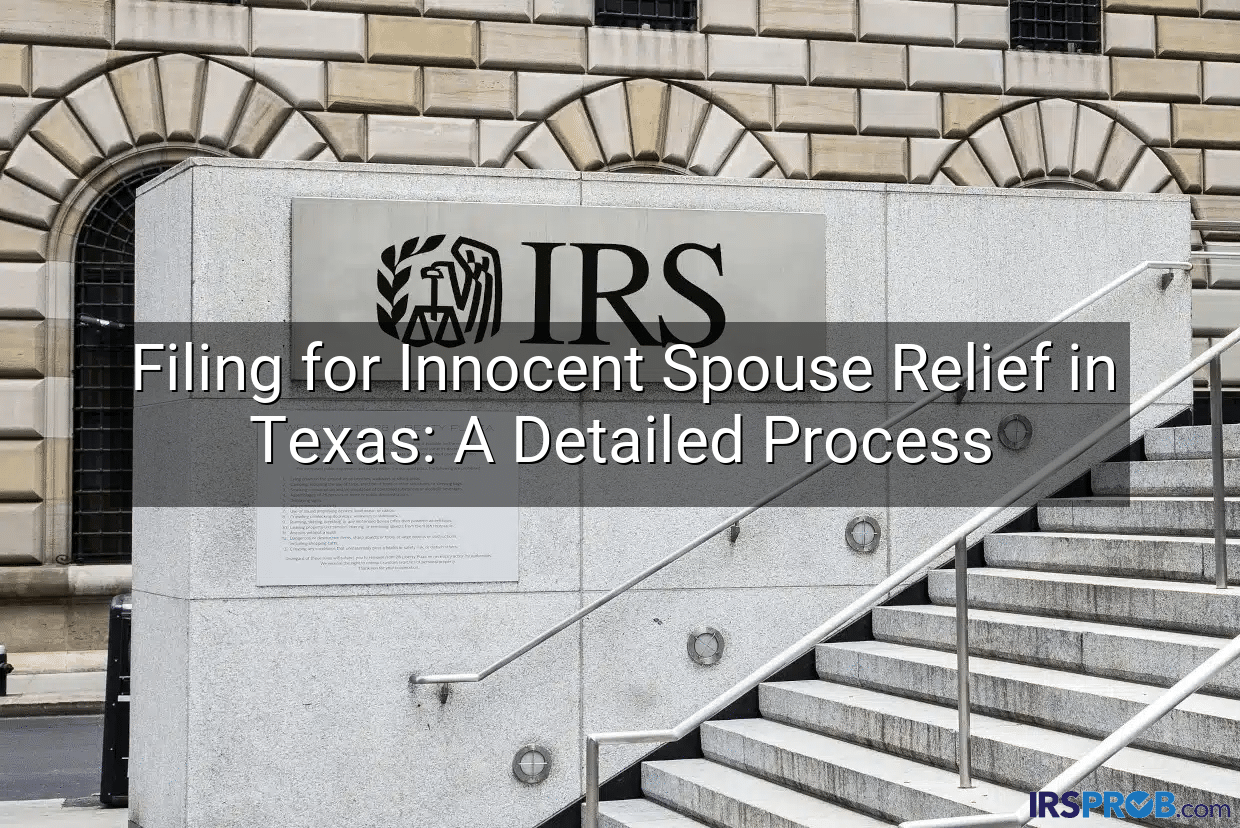Filing for Innocent Spouse Relief in Texas: A Comprehensive Guide
In Texas, many taxpayers face the daunting reality of being held jointly responsible for tax liabilities that may not entirely be their fault. The process to file innocent spouse relief is a potential lifeline for those who have been unfairly burdened by errors and omissions resulting from their partner’s financial activities. This guide, created by IRS Prob, is designed to provide you with a detailed and step-by-step approach for filing innocent spouse relief in Texas. Through in-depth explanations, practical tips, and expert advice, we aim to illuminate the entire process so you can regain control and work towards resolving your tax concerns.
Joint tax filings have long been a symbol of shared responsibility in marriage. However, when one spouse makes financial missteps – such as underreporting income, misinterpreting tax laws, or failing to file appropriately – the innocent party may find themselves at risk of paying penalties and back taxes. Filing for innocent spouse relief is the mechanism put in place to alleviate this unfair burden, ensuring that penalty, interest, and tax assessments are directed only to the party responsible for the error.
This post elaborates on every crucial aspect of innocent spouse relief in Texas, empowering you with the knowledge necessary to navigate the intricate IRS processes. Whether you’re in the early stages of inquiry or ready to compile your documentation, our detailed walkthrough is tailored to your needs. With Texas-specific insights and local expertise courtesy of IRS Prob, you are now in a better position to make informed decisions and secure the relief you deserve.
Understanding Innocent Spouse Relief in Texas
The concept of innocent spouse relief stems from the desire to create fairness in joint tax filings. In Texas, where community property laws and unique marital financial arrangements often complicate tax matters, the relief process acknowledges that not all spouses are equally responsible for tax discrepancies. This understanding was devised to protect individuals who had no involvement in the questionable tax practices of their partners.
In essence, innocent spouse relief is a provision that allows a taxpayer to request that the IRS remove some or all of the tax burden resulting from their spouse’s errors on a joint tax return. The rationale behind this is both practical and ethical: it prevents an innocent person from being penalized for decisions they did not make or actions over which they had no control. Given the additional complexities of Texas marriage regulations, this relief holds a special place as it aligns with the state’s commitment to safeguarding individual financial responsibility within marital relationships.
Furthermore, understanding Texas-specific nuances is essential. Texas residents benefit from knowing that local legal and tax professionals, like those at IRS Prob, work diligently to streamline the process. By bringing local expertise into the discussion, you are better prepared to face challenges such as navigating state community property laws and understanding the interplay between federal and state tax regulations within Texas.
Eligibility Criteria and Requirements for Innocent Spouse Relief
Before you decide to file for innocent spouse relief, it is critical to understand the eligibility criteria established by the IRS. These requirements are designed to establish that not only were you unaware of the discrepancies on your joint return, but that you also had no participation in the actions that led to a tax deficiency. In Texas, these criteria are interpreted with an understanding of the state’s legal framework, ensuring that the relief is fair and just.
Primarily, the IRS considers three types of relief: innocent spouse relief, separation of liability relief, and equitable relief. While the procedures might overlap, the essential factors for eligibility remain similar. For the classic innocent spouse relief, the IRS generally requires that you prove all of the following:
- You filed a joint return which resulted in an understatement of tax.
- You did not know, and had no reason to know, about the understatement of tax when you signed the return.
- You are now either divorced, widowed, or no longer matrimony with the taxpayer who committed the error.
It is also important to be aware that innocent spouse relief is not automatically granted. You must file a request with the IRS within a specified time frame after you become aware of the tax deficiency. Detailed records and supporting documents are needed to prove your case, including financial records, correspondence, and sometimes, evidence from legal professionals who understand the intricacies of Texas law.
Many factors can influence your eligibility, including the timing of your actions, the nature of your financial arrangements, and whether you were truly aware of the inaccuracies in your tax return. Seeking assistance from knowledgeable professionals, such as those at IRS Prob, ensures that your submission is thorough and convincingly reflects your lack of culpability in the errors made.
Step-by-Step Process for Filing Innocent Spouse Relief in Texas
The process of filing for innocent spouse relief in Texas is detailed and follows strict guidelines set by the IRS. Each step requires precision, patience, and a deep understanding of the documentation involved. By breaking down the process into manageable parts, you can approach each step methodically, ensuring no crucial detail is overlooked.
The filing process begins with the submission of Form 8857, Request for Innocent Spouse Relief. This form asks for detailed personal information as well as specifics regarding the tax deficiency that prompted your claim. In filling out this form, accuracy is paramount: errors or omissions can significantly delay your case or result in the denial of your request. For Texas residents, ensuring that the form reflects local nuances and specific circumstances is just as critical.
One of the first steps is gathering all the necessary documentation. This typically includes copies of your joint tax returns, supporting financial statements, evidence of marital separation (if applicable), and any communications with the IRS regarding prior inquiries or notices delivered to your home. Assembling this documentation in a systematic manner not only expedites the process but also prevents potential delays in your filing.
After submission, you will enter a waiting period during which the IRS reviews your request. During this time, it is essential to follow up with any additional documents the IRS may request. Your proactive engagement can help facilitate a smoother process. The IRS might conduct an interview or require further clarification on certain items from your form. Maintaining consistent communication and promptly addressing any inquiries can significantly improve your chances of success.
Another important step is to consult with a tax professional. Experienced advisors, particularly those familiar with Texas tax laws and the IRS’s procedures, can provide invaluable insights into how best to present your case. They ensure that all forms are properly filled and help you strategize on how to tackle any possible objections raised by the IRS.
Finally, once your case has been fully reviewed, the IRS will issue a decision. If approved, you will be relieved of the liability associated with the tax deficiency. If not approved, you still have options for appeal, and professional guidance is essential during this phase.
Gathering Documentation and Supporting Evidence
Proper documentation is the cornerstone of a successful innocent spouse relief filing. In Texas, the complexity of marital financial arrangements demands that every piece of evidence is thoroughly organized and presented clearly. This section outlines the kinds of documents you may need, how to gather them, and why each component is integral to building your case.
The primary documentation required typically includes copies of your joint tax returns for the years in question. In addition to the tax return forms, supporting documents such as W-2 forms, 1099 forms, and other proofs of income are crucial. These documents, when compiled and cross-referenced, offer a detailed picture of your financial situation, helping to establish that you were unaware of any discrepancies.
Beyond tax returns, records that prove your lack of involvement in the erroneous tax reporting are just as significant. This may include bank statements, credit card statements, and even emails or letters that indicate that you were not involved in decisions regarding major financial transactions. Any documentation that demonstrates a clear separation of financial responsibilities within your household can be a powerful piece of evidence.
Legal documents, such as divorce decrees, separation agreements, or even affidavits from financial advisors or attorneys, reinforce your claims. These documents support your narrative by providing an official record of your arguments for relief, especially in cases where there is evidence of a lack of knowledge or consent. Ensuring that these documents are up-to-date and legally sound is essential, particularly in a state like Texas where community property laws might affect how financial responsibilities are interpreted.
Moreover, maintaining a communication log with the IRS is advisable. Every interaction, whether it be a phone call or correspondence, should be documented and stored securely. This log evidences your proactive engagement in the process and can serve as supplementary proof should disputes arise later in the review process.
The process of gathering documentation should be approached meticulously. Consider organizing your evidence into clearly labeled folders or digital files, categorizing them by year, by type, or by relevance to each claim in your file. This level of organization not only impresses upon the IRS your diligence but also minimizes the risk of misplacing crucial documents when they are needed at a critical stage.
Common Mistakes, Pitfalls, and How to Avoid Them
Navigating IRS processes is never without its challenges. Even minor oversights can lead to delays or denials when filing for innocent spouse relief in Texas. In this section, we detail some of the most common pitfalls encountered by taxpayers and share strategies to ensure that your filing is as error-free as possible.
One frequent mistake is incomplete or inaccurate documentation. Many taxpayers find themselves unprepared because they fail to compile all necessary documents before filing. Missing bank statements, incorrect personal details, or outdated tax returns can hamper your application process. To avoid this, double-check every document and form before submission, and consider using a checklist to ensure nothing is omitted.
Another pitfall involves failure to adhere to deadlines. The IRS imposes strict timelines for submitting your innocent spouse relief request, and missing these deadlines can jeopardize your chance to obtain relief. It is essential to mark your calendar with all relevant due dates, and to begin gathering documentation as soon as you are aware of the tax error in question. Waiting until the last minute can lead to oversight and an incomplete application that ultimately costs you dearly.
Lack of professional consultation is another scenario that can lead taxpayers astray. The intricacies of Texas tax law mean that having a professional on your side can provide clarity in a complex process. Engaging with a knowledgeable tax professional or legal advisor can help mitigate risks, correct mistakes before they become problematic, and ensure that you comply with both federal and state regulations.
Furthermore, one common misstep is the failure to communicate effectively with the IRS after submitting your claim. Many taxpayers assume that once the forms are in, no further action is required. However, the IRS may request additional information or clarification. Responding promptly and thoroughly is essential to keep your case moving forward without unnecessary delays.
Finally, not keeping a record of all interactions with the IRS can severely undermine your claim. Each communication or response from the IRS should be documented; this record can serve as evidence if inconsistencies or disputes occur later in the process. Failing to maintain such documentation often forces taxpayers to restart the process or lose credibility when challenges arise.
How IRS Prob Can Assist Texas Residents in Filing for Relief
Texas taxpayers have the advantage of local expertise when it comes to filing for innocent spouse relief. IRS Prob, a dedicated service provider, specializes in guiding clients through the complexities of IRS procedures, ensuring that every document is meticulously prepared and that your claim is as comprehensive as possible. This section details the specific ways in which IRS Prob can support you during each phase of your application.
IRS Prob brings a wealth of knowledge and years of experience working with the IRS on complex tax issues. Their team understands the subtle nuances of Texas tax law, and they are adept at gathering and organizing the relevant documentation required for your innocent spouse relief application. By leveraging their expertise, you can avoid common pitfalls and streamline the filing process, making your case more robust and compelling.
One of the greatest benefits of working with IRS Prob is personalized consultation. Each case is unique, and professional advisors can tailor their approach to suit your specific circumstances. This personalized assistance helps in identifying any potential weaknesses in your application and allows for preemptive corrections. Whether it is clarifying eligibility criteria or determining the best way to format and present documented evidence, IRS Prob ensures that your submission meets every IRS requirement.
Moreover, IRS Prob’s comprehensive review process means that every element of your application is thoroughly scrutinized. Their expert team cross-checks all the details on Form 8857 and related documents, identifying errors or oversights that might otherwise cost you the relief you need. Their proactive approach guarantees that any discrepancies are corrected well before final submission, reducing the chances of delays or denials.
Additionally, IRS Prob maintains a strong relationship with local tax authorities and professionals in Texas. This network of experts allows them to stay updated on any changes or updates to tax laws that might affect your filing. Their insights ensure that your application is not only compliant with current regulations but is also forward-thinking, anticipating any potential challenges that may arise during the review process.
Lastly, IRS Prob supports you through post-submission interactions with the IRS. Should the IRS request additional information or clarification, IRS Prob will be there every step of the way. Their commitment to clear and consistent communication means you are never left in the dark regarding the status of your claim. This ongoing support is crucial, especially in cases that require significant follow-up or appeal measures.
Frequently Asked Questions about Filing for Innocent Spouse Relief in Texas
Pro Tips from IRS Prob
Pro Tip #1: Organize Your Documentation Early
Start gathering every relevant document as soon as you suspect an issue on your joint return. Organize your tax returns, financial statements, and any relevant correspondence by year and category. This proactive approach not only reduces the risk of missing crucial records but also speeds up the reviewing process when filing for innocent spouse relief in Texas.
Pro Tip #2: Consult with a Tax Professional
Even if you feel confident about handling your tax self-preparation, an experienced tax advisor can make a significant difference. Professional guidance ensures that your Form 8857 and supportive evidence are meticulously prepared, ensuring all unique Texas aspects and IRS requirements are addressed. This can prevent costly mistakes and enhance the strength of your claim.
Pro Tip #3: Stay on Top of IRS Communications
Maintain clear and prompt communication with the IRS. Respond to any inquiries quickly and document all communications for future reference. Regular follow-up can help mitigate delays and keeps your case active, ensuring that all required documents and clarifications are submitted in a timely fashion to support your innocent spouse relief application.
This extensive guide is designed to empower Texas taxpayers who find themselves in the challenging position of being held accountable for tax liabilities they did not cause. With over 6,000 words of comprehensive information, step-by-step instructions, and professional insights, we have covered everything from understanding the basics of innocent spouse relief to gathering documentation, avoiding common mistakes, and leveraging local expertise from IRS Prob. By following this guide, you can approach your application with confidence, knowing that you possess the necessary tools and knowledge to navigate the IRS process successfully.
Remember, while the journey to innocent spouse relief can be complex, taking each step methodically and using professional support minimizes potential setbacks. With the assistance provided here, along with our tailored pro tips, you are better equipped to address any issues that may arise during the process. We encourage you to revisit each section as you prepare your submission, ensuring that every detail is perfected before moving forward with your request. Your financial freedom and peace of mind depend on it.
If you have further questions or need personalized help, do not hesitate to reach out to IRS Prob, who are well-versed in Texas tax law and ready to assist you every step of the way. Your journey toward reclaiming control over your financial responsibilities starts with a single step—armed with this guide, you are now prepared to file innocent spouse relief in Texas with confidence and clarity.









